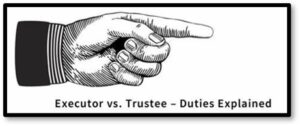Monday Author: Susanne Skinner
Wills and trusts are the dry subject matter of estate planning until you’re in the thick of it. The law is a harsh mistress and gives no quarter for shortcuts.
 My Dad passed away last year and I am his executor and trustee. Although we talked about it, I was unprepared for the role. Our discussions never got farther than Dad waiving his hands and saying, “Don’t worry, it’s all here.” I did not know what to ask and when the time came, I was overwhelmed and under equipped.
My Dad passed away last year and I am his executor and trustee. Although we talked about it, I was unprepared for the role. Our discussions never got farther than Dad waiving his hands and saying, “Don’t worry, it’s all here.” I did not know what to ask and when the time came, I was overwhelmed and under equipped.
The good news is Dad kept everything. The bad news is everything was extremely disorganized and none of it was labeled.
Six years ago, I moved him to assisted living and it fell to me to empty out his house. Over time I sorted, labeled and categorized ever piece of paper. It is an enormous and ongoing task. Dad had absolutely no filing system and I had limited knowledge of the scope of his estate.
There is No Such Thing as Too Prepared
As executor and trustee, I discovered the differences and nuances in real time. Both come with distinct responsibilities and both are time-consuming. It is my new full-time job.
Dad’s escalating dementia caused forgetfulness he tried to hide. He could not provide answers to specific questions and was unable to recall details. Thankfully, he worked with an estate attorney on a will, medical directives, a power of attorney and an assignment of trustee. It’s a start, but it is not enough.
Hindsight is a great teacher. When planning my own affairs, I used the playbook I created from this experience. I designed a tabbed notebook with labels for each account, policy, and plan, including contact information.
I recommend duplicating all content in digital format so both are readily available. Order at least one dozen death certificates with a seal. Copies are not always accepted.
What is an Executor?
Executors distribute assets according to the terms of a will, under the probate court’s supervision. This is a limited responsibility over a short period, with up-front effort.
 An executor is legally named in a will as the person responsible for distributing the estate to beneficiaries according to the terms in the will. An executor is required to:
An executor is legally named in a will as the person responsible for distributing the estate to beneficiaries according to the terms in the will. An executor is required to:
- Obtain a copy of the will and offer it for probate
- Appear in court on behalf of the estate and obtain a grant of probate, authorizing action on behalf of the estate
- Notify relevant financial institutions of the death (credit card companies, military and civilian retirement, insurance, vendors, etc.)
- Open a bank account for the estate
- Pay bills and taxes of the estate
- Inventory estate assets
- Manage the property until it is distributed or sold
- Distribute the assets to named beneficiaries
- Close out the estate with the probate court
What is a Trustee?
A trustee manages a trust for the life of the trust. In my Dad’s case, it began during his lifetime and continues after his death. The responsibility of a trustee requires long-term management of assets and can last for decades. A trustee does not report to a court.
A trustee is the legally named person responsible for distributing trust assets to beneficiaries according to the terms of the trust. A trustee is required to:
- Manage the trust assets during the life of the trustor (person creating the trust) and after their death, for as long as the trust exists. This includes investments and property.
- Obtain a tax ID for the trust
- Manage a bank account for the trust
- Maintain records of the trust
- Pay the bills of the trust
- Distribute the trust assets according to the terms laid out in the trust directives.
We should all have estate plans, yet it is often the very last thing we do. The knowledge of its importance is not enough to compel us to complete the task.
Notary, Fax and Affidavits
Being an executor and/or trustee is a complicated, time-sensitive duty and it carries legal liability. Processing paperwork requires signatures, witnesses and a notary. My local UPS office was a sweet find for nearby notarizing and faxing.
Affidavits of trustee, living children, and domicile require a notary. Original copies of the death certificate must be snail mailed and each sibling beneficiary must complete an information form with all sibling’s Social Security numbers, addresses and dates of birth.
There are specific policies for my disabled sister. Insurance refused to pay her directly. Neither would they pay me (as guardian) or my father’s trust. It is a third-party trust—assets not owned by the person who benefits—and legally prohibited from accepting payment. I hired an elder-care attorney to set up a first-person trust. I literally paid someone $3500 so my sister can have what is already hers because Dad did not assign the trust as the beneficiary.
Document processing is slow, especially with insurance companies. I have to prove my Dad is my Dad, providing birth and death certificates, copies of his trust, and witnesses to certify me as his daughter.
Keep documents current. Two non-updated policies in my mother’s name required proof of her death, requiring additional paperwork from all surviving children.
Plan Wisely, Plan Well
 Executors and trustees are critical roles in asset distribution. When considering someone to serve in this capacity ensure all parties understand the duties and responsibilities. Seek expert guidance and understand the governing laws. Put all relevant documents in one location. I recommend USBs, and hard copies with attorneys and executors.
Executors and trustees are critical roles in asset distribution. When considering someone to serve in this capacity ensure all parties understand the duties and responsibilities. Seek expert guidance and understand the governing laws. Put all relevant documents in one location. I recommend USBs, and hard copies with attorneys and executors.
Discuss plans and intentions with family members. Surprises cause irrevocable harm. The disorganization of my Dad’s estate and finances motivated me to discuss, create and implement a thorough plan with my husband and our children.
Estate Planning is one of the most important things you can do
for your loved ones.
